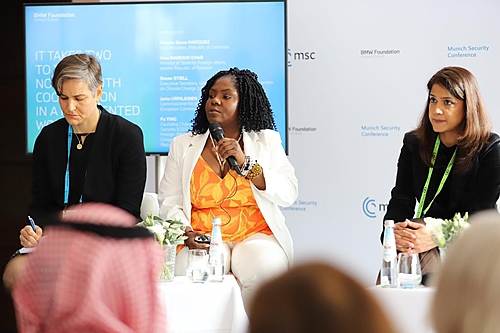
During this year’s Security Conference in Munich, Germany, Vice President of Colombia Francia Márquez raised a provocation: “We have to ask ourselves: what makes us feel insecure?”. Afro-feminist and award-winning environmental activist in one of the countries that most kills people fighting for the protection of the environment in Latin America, according to Global Witness, Márquez brought to the most important event in the discussion of international security policies a different way of looking at the theme: “We cannot solve the problem of gun insecurity,” he declared.
The proposal seems to break with established paradigms on how to combat insecurity in territories and what it means to act in contexts of violence. The speech by the vice president, leader in a country crossed by decades of armed conflict, proposes a demilitarized vision of security and a new world order based on the defense of life.
Following the policy of “total peace” that the Pacto Histórico party brings to Colombia, this would be possible by placing marginalized groups at the center, which are fundamental actors for the subsistence of communities and societies, during and after conflicts. “Women were the ones who rebuilt countries in the post-war period, in Germany, in several countries in Africa and Latin America”, pointed out Francia, on the occasion.
a feminist perspective
It is the most vulnerable social groups and, therefore, most affected in situations of conflict and insecurity, that propose and fight, in the first place, for a broader approach to the problem. Currents of feminism in Latin America have been discussing what this integral approach means, while bringing to the discussion one of the groups that are the target of different forms of violence in societies.
For lawyer Natalia D’Alessandro, a former employee of the Ministry of Security in Argentina, the key is to apply and make the most comprehensive policy tools. “Addressing the issue of security must necessarily integrate other policies, not just the establishment of social order and punishment,” she explains. “The State must be present in its wide range of actors, dependencies and political interventions, from social development to culture, education, in the inclusion of young people”, says D’Alessandro.
In Argentina there is a great debate on the subject. Recently, attention has turned to drug trafficking in the city of Rosario, in the province of Santa Fe, after an attack with bullets on the supermarket owned by the wife of player Lionel Messi. The episode highlighted a long-standing problem: Rosario has the highest murder rates in the country and is the place with the highest incidence of this type of criminal organization – which also involves members of the security forces themselves.
The response that comes from the political leadership to the problem tends to be unanimous: sending military personnel and few effective proposals on what these military personnel will do in the territories.
“Unfortunately, this is still common sense in Latin America, systematically reinforced by the media, by the same economic financial capital and also by a very marked class vision”, observes D’Alessandro.
“It’s an idea of a reactive and exclusionary security policy, which spectacularizes the theme in an attempt to make a market product: they show militarized territories and spread the conditions of tension in prisons, as happened in El Salvador under the management of Nayib Bukele , as if that were the objective. As if building an effective line in terms of security meant violating rights.”
Representativeness
Therefore, representativeness in decision-making spaces becomes a relevant guideline for thinking about public policies and establishing a comprehensive approach to security issues on the agenda. According to the most up-to-date global data from the United Nations (UN) Women, in 2021, 21.9% of ministries were led by women and only 19.2% in countries in conflict or post-conflict situations.
Master in international relations and specialist in international security, Mila Campbell, sheds light on the current scenario in Brazil with the appointment of the ministers of Racial Equality, Anielle Franco, and of Indigenous Peoples, Sônia Guajajara, in addition to the first female secretary-general in the Ministry of Foreign Affairs, Maria Laura da Rocha.
“We have to recognize this also as a result of a struggle, often silenced, for women to reach hierarchical positions in the State”, he points out. “It is a very important milestone to see women not only in civil society activism, but also being highlighted, for example, in Brazilian foreign policy.”
In this sense, there is also a focus on the presence of women in peacekeeping missions. “The women, peace and security agenda is very strong, and it was initiated by UN Council Resolution 1325,” says Campbell. “This resolution translates the need to include women not only in debates on conflict resolution, but also within peacekeeping missions. We have Brazilian military personnel recognized internationally for their work in conflict scenarios and for the care they take to ensure mission mandates are have that commitment to the women and security agenda.”
In the case of Colombia, the researcher’s study territory, the organization of women in the territories affected by the armed conflict and the fight against drug trafficking focused on the Peace Agreement itself, signed in 2016 between the government and the guerrillas. The document includes a perspective on overcoming historical inequalities in the country, such as gender.
“There are public policy indicators derived from this framework of the Peace Agreement on the issue of gender”, says the researcher. “These are policies aimed at women as the main representatives of families, because the partners had to enlist in the guerrillas or paramilitaries; at single mothers; and at those who acted so that their own communities had some kind of subsistence in a scenario of armed conflict. They are women who have great difficulty in having their socioeconomic empowerment”, she points out. “That’s why Francia’s presence as vice-president of Colombia is a bit of that historic combination: recognition of the role that women played and still play in overcoming violence.”
Editing: Patricia de Matos
Source: www.brasildefato.com.br

